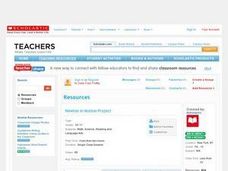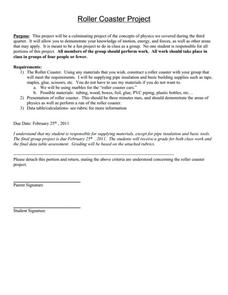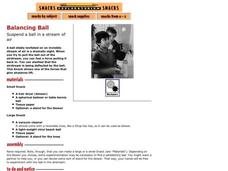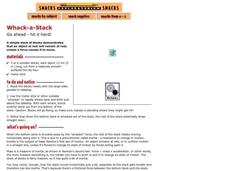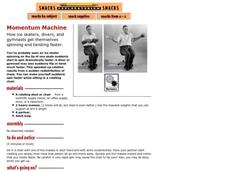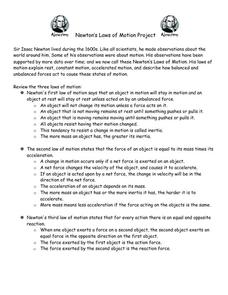Teach Engineering
Physics Tug of War
Slide books with a little assistance from Newton. Using books, groups create a demonstration of Newton's Second Law of motion. Pupils compare the distance traveled by one and two books when they apply a force to them.
It's About Time
Circular Motion
Lead your class in this exciting activity to learn more about motion and its importance. Pupils learn about a centripetal and why it is required to maintain a constant speed in a circulating moving mass. They apply the equation for...
Teach Engineering
Equal and Opposite Thrust in Aircraft: You're a Pushover!
It's the law—every action requires a reaction, no matter how small. Pupils experience two demonstrations of Newton's third law of motion as it relates to thrust in the 10th segment of a 22-part unit on flight. Using their mathematical...
Curated OER
Newton in Motion-Project
Students investigate Newton's Third Law of Motion. In this Newton's Third Law of Motion lesson, students explore the law in the real world. Students break down the definition for understanding and do an experiment using a balloon.
Teach Engineering
Magical Motion
Make solutions to projectile motion problems magically appear using equations. Pupils watch a clip from a Harry Potter movie and find the length of time it takes for a remembrall to fall into Harry's hands. They use a projectile motion...
Anchorage School District
Roller Coaster Project
Emerging engineers work in teams to design pipe insulation roller coasters for marbles that meet specific parameters. They are required to label along the track the areas where kinetic and potential energy are highest and lowest, where...
NASA
Egg Drop Lander
You have to crack a few eggs to make a good engineer! Working in small groups, young scholars design, build, and test devices that protect an egg from breaking when dropped from a ladder.
Exploratorium
Balancing Ball
Demonstrate lift to the class that is studying aerodynamics. In the stream of air produced by a blow dryer, little physicists place a wad of tissue paper and a spherical figure to compare. Or, if you have a vacuum cleaner and beach ball,...
MENSA Education & Research Foundation
Roller Coaster Mania!
Raise the energy level of your physical science class with this exciting hands-on activity. Applying their knowledge of kinetic and potential energy and Newton's laws of motion, young engineers use foam tubing and marbles to create...
It's About Time
Run and Jump
Has your class wondered how fast a human could run or how high they are capable of jumping? Help them understand these concepts as they explore acceleration and use an accelerometer to make semiquantitative measurements of acceleration...
Teach Engineering
The Great Gravity Escape
Groups simulate an orbit using a piece of string and a water balloon. Individuals spin in a circular path and calculate the balloon's velocity when the clothes pin can no longer hold onto the balloon.
Exploratorium
Whack-a-Stack
Go wild as you hit a stack of wooden blocks to demonstrate Newton's first and second laws of motion. The blocks at the top of the stack stay put as you knock one at a time out of the bottom. Note, however, that you will need to...
Exploratorium
Momentum Machine
If you have a rotating office chair in your classroom, you can have physics pupils participate in this simple, yet effective demonstration of angular momentum. One partner sits in the chair, arms outstretched, holding heavy weights. The...
DiscoverE
Build a Bobsled Racer
Host a design challenge of Olympic proportion! Junior engineers build their own bobsleds using simple materials. The activity focuses on kinetic and potential energy and how the center of mass affects motion on a downhill track....
Sharp School
Newton’s Laws of Motion Project
After a review of all three of Newton's laws, physical scientists complete a choice project. They can create a book in which they collect pictures where the laws of motion are depicted, produce a PowerPoint presentation, or produce a...
NASA
Touchdown
Just how do astronauts stay safe during moon landings? Here's an activity that allows investigators to use the engineering process to explore how shock absorbers protect astronauts during landing. Applying knowledge of gravity, force,...
PBS
Pop Fly
A lever comes in handy when scholars build a launcher for a ping-pong ball. They test the launcher and redesign it to send the ball higher or to accommodate a tennis ball. This is the third lesson in a five-part unit.
Teach Engineering
Exploring Acceleration with an Android
Small groups use rubber bands to accelerate an Android device along a track of books. They collect the acceleration data and analyze it in order to determine the device's velocity.
DiscoverE
Friction in Action
There's no need to have friction among instructors regarding the resource. Pupils investigate how marbles and coins slide along different surfaces which gives them information to estimate coefficients of friction.
DiscoverE
Slinky® Science
Toys are great for learning about physics. Scholars use Slinky® toys to study Newton's laws of motion and types of energy. After a little play, they then model longitudinal and transverse waves with the Slinky® toys.
It's About Time
The Mu of the Shoe
What is mu? Emerging scientists explore the coefficient of sliding friction, or mu, and apply its concepts as they complete activities in the interesting lesson. They measure the sliding friction between soles of their own athletic shoes...
DiscoverE
Air-Powered Mini Rocket
Does the position of the clips make a difference? The activity provides directions to build and test a paper rocket. Pupils attach paper clips to the rocket in different configurations and measure the distance the rocket flies each time....
Museum of Science
Balloon Racers
Watch those balloon cars go! Scholars build racers that run using the power of balloons and conduct races with the cars. They learn about Newton's third law of motion and how it applies to their balloon racers.
Teach Engineering
Ramp and Review (for High School)
Rolling for momentum. As part of a study of mechanical energy, momentum, and friction, class members experiment rolling a ball down an incline and having it collide with a cup. Groups take multiple measurements and perform...



